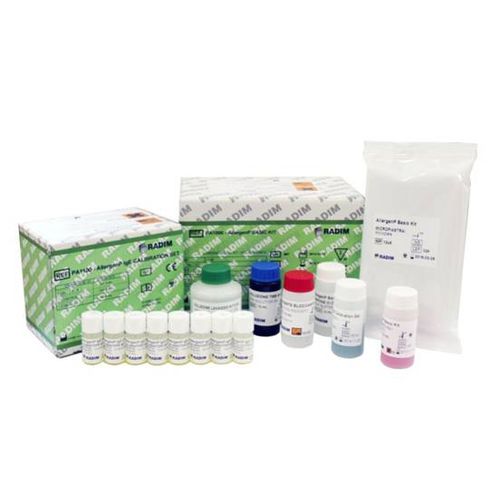
- Laboratory
- Laboratory medicine
- Rapid TORCH infection test
- DIA LAB Services Srl
Rapid TORCH infection test K1TG food intoleranceIgGIgG4
Add to favorites
Compare this product
fo_shop_gate_exact_title
Characteristics
- Applications
- for TORCH infections, food intolerance
- Tested parameter
- IgG, IgG4, IgM
- Sample type
- blood, laboratory, biological, cell
- Analysis mode
- ELISA, enzyme immunoassay, molecular
- Result display time
90 min, 150 min
- Sample volume
0.01 ml
(0.00034 US fl oz)- Specificity
97.2 %, 97.5 %, 98.2 %, 99.1 %, 100 %
- Sensitivity
87.8 %, 96.4 %, 97.1 %, 98.1 %, 100 %
Description
World Health organization has identi ed a number of congenital infections causing persistent structural changes in fetal intrauterine infection in a single complex, which included viral, fungal, protozoal and bacterial infections, and merged them in ToRCH-complex.
Prenatal infections remain a serious problem of the modern medicine, despite the obvious successes reached last decades. Pathogens capable to cause such an infection widely circulate among the human population.
In laboratory diagnostics of the fetal infections all spectrum of diagnostic methods is applied: from various variants of microscopy and pathogen isolation on cell culture, up to enzyme immunoassay testing and molecular-biological diagnostic methods (PCR, nASBA, etc.).
But only diagnostics based on serological blood markers detection is simple enough and extremely important for fetal infections precaution at pregnant women. These methods include enzyme immunoassay (EIA) and other immunological analyses. only the results of a comprehensive serum research on speci c IgG and IgM antibodies and antibody avidity determination of class G, we can establish the woman immune status concerning fetal infections and to predict group and degree of risk. nowadays ELISA is a unique screening method, allowing to survey large population groups for de nition the risk of contamination by fetal infections and after vaccination immune status.
Catalogs
No catalogs are available for this product.
See all of DIA LAB Services Srl‘s catalogsRelated Searches
- Blood rapid diagnostic test
- Immunoassay rapid diagnostic test
- Serum rapid diagnostic test
- Infectious disease rapid diagnostic test
- Laboratory rapid diagnostic test
- Cell rapid diagnostic test
- ELISA rapid diagnostic test
- Hemocytometer
- Blood cell hemocytometer
- IgA rapid test
- Rapid biological test
- Automatic blood cell counter
- Benchtop blood cell counter
- Allergy rapid diagnostic test
- Rapid enzyme immunoassay test
- Rapid food intolerance test
- Rapid TORCH infection test
*Prices are pre-tax. They exclude delivery charges and customs duties and do not include additional charges for installation or activation options. Prices are indicative only and may vary by country, with changes to the cost of raw materials and exchange rates.


